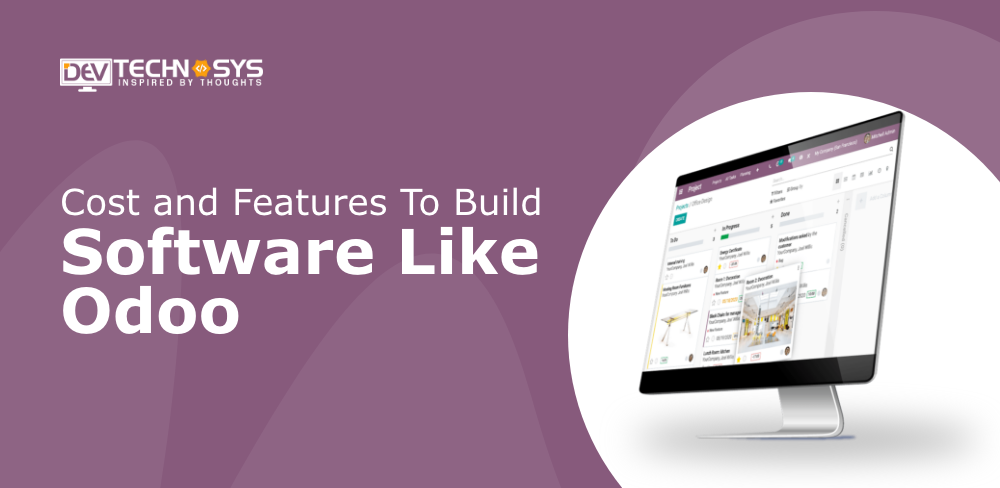Are you looking to build software like Odoo, then you must read this blog. In today’s rapidly evolving business landscape, companies are constantly seeking innovative solutions to streamline their operations and enhance productivity. Odoo, an all-in-one business management software, has emerged as a game-changer, offering a comprehensive suite of applications tailored to meet diverse organizational needs.
However, for those considering developing software similar to Odoo, it’s crucial to understand the intricacies involved in terms of cost and features. In this blog post, we delve into the essential aspects of building software like Odoo, exploring the key features to include and providing valuable insights into estimating development costs.
So, if you’re ready to embark on the journey of creating your own versatile business software, read on to discover the aspects that shape the cost and features of a robust solution like Odoo.
Q1. What is Odoo?
Odoo, formerly known as OpenERP, is an open-source business management software that provides a comprehensive suite of integrated applications for various business operations. It encompasses a wide range of modules and functionalities, including customer relationship management (CRM), sales, inventory management, project management, accounting, manufacturing, human resources, and more.
Odoo is designed to be modular, allowing businesses to select and configure the modules that suit their specific needs. The software provides a unified and centralized platform for managing different aspects of a business, enabling improved communication, streamlined processes, and efficient data management.
Q2. How Does Odoo Software Work?
Odoo operates on a modular structure, allowing users to select and customize the modules that best suit their business needs.
At its core, Odoo functions as a central database where all data is stored and accessed. The different modules cover a wide range of business functionalities such as sales, CRM, inventory management, accounting, human resources, and more. Each module is designed to handle specific tasks and can be interconnected to provide a comprehensive system.
Users can configure Odoo by enabling or disabling modules, and customizing fields, workflows, and reports to align with their business requirements. The software provides a user-friendly interface that allows employees to navigate through different modules and perform their tasks efficiently.
Odoo also supports third-party integrations, allowing businesses to connect with other software and services to enhance functionality. Additionally, it provides tools for data analysis, reporting, and collaboration, enabling businesses to make informed decisions and foster efficient teamwork.
Odoo has over 3 million users worldwide, across all industries and sizes of businesses.
Q3. How to Use Odoo Software?
To use Odoo effectively, follow these steps:
- Installation: Install Odoo on your server or use the cloud-based version provided by Odoo SA.
- Set Up: Configure Odoo by defining your company details, organizational structure, and user access rights.
- Modules: Explore and install the required modules from Odoo’s app store, based on your business needs. Modules cover areas such as sales, CRM, accounting, inventory, manufacturing, HR, and more.
- Customization: Customize the software to match your specific requirements by modifying existing modules or creating new ones. Odoo’s modular architecture allows flexibility in tailoring the software to your needs.
- Data Entry: Enter your business data, such as products, customers, suppliers, and employees, into the relevant modules.
- Workflows: Define workflows and processes within Odoo by configuring automation rules, notifications, and approval mechanisms.
- Reporting: Utilize the reporting tools in Odoo to generate insightful reports and analytics for monitoring your business performance.
- Collaboration: Encourage collaboration among employees by using Odoo’s integrated communication tools, such as chats, emails, and documents.
- Integration: Integrate Odoo with other systems, such as payment gateways, eCommerce platforms, or third-party applications, to enhance its functionality.
- Support and Maintenance: Stay updated with the latest Odoo releases and security patches, and seek professional support when needed.
Odoo has over 3000 apps available, covering a wide range of business functions.
Q4. What Are the Competitors of Odoo?
While Odoo is a comprehensive solution, there are several other competitors in the market that offer similar products and services. Some of the notable competitors of Odoo include:
- SAP Business One:
SAP Business One is an integrated enterprise resource planning (ERP) software solution designed for small and medium-sized businesses. It provides functionalities for finance, sales, purchasing, inventory, and manufacturing, among others.
- Microsoft Dynamics 365:
Microsoft Dynamics 365 is a cloud-based suite of business applications that includes modules for sales, customer service, finance, supply chain management, and more. It offers a range of integrated tools and analytics for managing various aspects of a business.
- Salesforce:
Salesforce is a cloud-based CRM (Customer Relationship Management) platform that provides a comprehensive set of tools for managing customer relationships, sales processes, and marketing campaigns. It offers extensive customization options and integrates with various other business systems.
- NetSuite:
NetSuite is a cloud-based ERP system that provides modules for financial management, inventory control, supply chain management, customer relationship management, and e-commerce. It caters to a wide range of industries and offers scalability for growing businesses
- Zoho One:
Zoho One is a suite of cloud-based applications that offers a range of business tools, including CRM, finance, human resources, project management, and collaboration. It provides integration capabilities and aims to provide a unified experience across different business functions.
- Epicor ERP:
Epicor ERP is an integrated software suite designed for manufacturing, distribution, retail, and service industries. It provides features for financial management, supply chain management, production management, and customer relationship management.
- Infor ERP:
Infor ERP is a suite of industry-specific enterprise resource planning solutions that cater to various sectors such as manufacturing, distribution, healthcare, and hospitality. It offers comprehensive functionalities for managing core business processes.
Q5. How Does Odoo Make Money?
While the core Odoo software is open source and freely available, the company generates revenue through various means. Here are the primary ways Odoo makes money:
- Enterprise Edition:
Odoo offers an Enterprise Edition of its software, which includes additional features and support not available in the open-source version. The Enterprise Edition is a subscription-based model, and customers pay a fee based on the number of users and the selected modules.
- Hosting and Cloud Services:
Odoo provides hosting and cloud services to its customers. This option allows businesses to access Odoo software without the need for their own infrastructure or IT support. Customers pay a recurring fee for hosting, maintenance, and support services provided by Odoo.
- Support and Maintenance:
Odoo offers support and maintenance services to its customers. This includes technical support, bug fixes, and software updates. Customers can purchase support packages based on their requirements.
- Customization and Implementation Services:
Odoo provides customization and implementation services to businesses that require tailor-made solutions. These services include customizing the software to fit specific business needs, integrating Odoo with existing systems, data migration, and training. The fees for these services are typically project-based.
- Marketplace and Apps:
Odoo operates an app store and marketplace where developers can sell their extensions, modules, and themes for Odoo. Odoo takes a commission from the sales made on its platform, providing developers with a marketplace to monetize their creations.
- Training and Certification:
Odoo offers training programs and certifications for users, developers, and implementation partners. These training courses cover various aspects of Odoo software and provide individuals and businesses with the knowledge and skills to work effectively with Odoo. Participants pay fees for training and certification programs.
Q6. What are the Features of Odoo?
As per the software development company, below are some amazing features that you must take into consideration.
- Modular Structure:
Odoo is designed with a modular structure, allowing businesses to choose and integrate specific modules based on their requirements. Modules are available for various functions such as accounting, CRM, inventory management, manufacturing, project management, sales, and more.
- Customizable:
Odoo provides a highly customizable platform, allowing businesses to adapt and tailor the software to their specific needs. It offers a user-friendly interface that enables customization without requiring extensive technical knowledge.
- Integrated Applications:
Odoo integrates various applications seamlessly, enabling smooth communication and data sharing between different departments and functions within an organization. This integration helps improve efficiency and reduces the need for manual data entry.
- Scalability:
Odoo can scale to accommodate the needs of businesses of different sizes, from small startups to large enterprises. The modular nature of Odoo allows businesses to add or remove modules as their requirements change over time.
- CRM (Customer Relationship Management):
Odoo includes robust CRM capabilities to manage customer interactions, track leads, automate sales processes, and manage customer support tickets.
- Accounting and Finance:
Odoo provides comprehensive accounting features, including general ledger, accounts receivable and payable, invoicing, bank reconciliation, financial reporting, and tax management. It supports multiple currencies and allows integration with external accounting tools.
- Inventory Management:
Odoo offers advanced inventory management capabilities, including real-time stock tracking, automated stock replenishment, barcode scanning, warehouse management, and integration with e-commerce platforms.
- Manufacturing:
Odoo’s manufacturing module enables businesses to manage their production processes, including bill of materials (BOM) management, work center scheduling, quality control, and material requirements planning (MRP).
- E-commerce:
Odoo includes an e-commerce module that allows businesses to create and manage online stores. It provides features for product catalog management, shopping cart functionality, payment integration, order processing, and customer management. additionally, you can add these features when you build software like Odoo.
- Project Management:
Odoo offers project management features to plan, schedule, and track projects. It includes task management, Gantt charts, resource allocation, time tracking, and collaboration tools for effective project execution.
- Reporting and Analytics:
Odoo provides built-in reporting and analytics tools that enable businesses to generate customized reports, analyze data, and gain insights into various aspects of their operations.
The global CRM software market is expected to reach $82.44 billion by 2025.
Q7. What Are the Benefits of Odoo Software?
Here are some of the key benefits of using Odoo software:
- All-in-one Solution:
Odoo provides a fully integrated suite of applications that cover various business functions, including CRM, sales, accounting, inventory, manufacturing, project management, HR, and more. This integration eliminates the need for multiple separate software systems and allows for seamless data sharing and workflow automation.
- Scalability:
Odoo is highly scalable, meaning it can accommodate the needs of small businesses as well as large enterprises. As your business grows, you can easily add new modules and functionalities to meet your evolving requirements.
- Customization:
Odoo offers extensive customization capabilities, allowing businesses to tailor the software to their specific needs. Users can modify workflows, create custom reports, design personalized dashboards, and develop new modules to address unique business processes.
- Cost-Effective:
Odoo is open-source software, which means it can be used without licensing fees. This makes it a cost-effective solution compared to many other ERP and business management software options on the market. Additionally, the modular structure of Odoo allows businesses to choose and pay for only the modules they need, reducing unnecessary expenses.
- User-Friendly Interface:
Odoo has a user-friendly and intuitive interface, making it easy for employees to learn and navigate the system. The software is designed with a consistent and modern look, providing a seamless user experience across different modules.
- Community and Support:
Odoo has a large and active community of users and developers who contribute to its continuous improvement. This community provides support, shares knowledge, and develops additional modules and enhancements, ensuring a vibrant ecosystem around the software.
- Mobile Accessibility:
Odoo offers mobile applications for iOS and Android devices, enabling users to access and manage their business operations on the go. This allows for remote work, field sales management, and real-time collaboration.
- Integration Capabilities:
Odoo can integrate with various third-party applications and services, such as payment gateways, shipping providers, e-commerce platforms, marketing tools, and more. This integration capability enables businesses to streamline their operations and enhance efficiency by connecting different systems.
- Analytics and Reporting:
Odoo provides powerful reporting and analytics features that allow users to gain insights into their business data. The software offers pre-built reports and customizable dashboards, helping businesses track key metrics, identify trends, and make data-driven decisions.
- Continuous Updates:
Odoo regularly releases updates and new versions to enhance functionality, security, and performance. These updates ensure that users have access to the latest features and improvements, keeping their systems up to date.
Interested in a chatbot demo, pricing, or more info? Fill out the form our expert will contact you shortly.
-
Chatbot Demo
-
Cost to Develop an app
-
Industry Report
-
Case Study
Q8. What Are the Drawbacks of Odoo Software?
Everything has its pros and cons. So does the Odoo software. We have listed down a few potential limitations or drawbacks that you must consider before you build software like Odoo :
- Complexity:
Odoo is a comprehensive and feature-rich software, which can make it complex and overwhelming for users who are not familiar with its functionalities. Setting up and configuring Odoo may require technical expertise, and customization can be challenging for non-technical users.
- Learning Curve:
Due to its extensive range of modules and functionalities, learning and mastering Odoo can take time and effort. Users, especially those new to enterprise resource planning (ERP) systems, may require significant training and support to effectively use and navigate the software.
- Performance and Scalability:
Odoo’s performance can be a concern, especially in larger installations or with a high volume of concurrent users. While performance improvements have been made in recent versions, larger databases, and complex configurations can still impact the software’s speed and responsiveness.
- Customization Limitations:
While Odoo offers customization options, there may be limitations in terms of modifying certain core functionalities. Customizing Odoo extensively or making changes to its underlying code can be challenging and may require technical expertise. Additionally, upgrading to new versions of Odoo can sometimes result in conflicts or issues with customizations.
- Community and Documentation:
While Odoo has an active community and a large user base, the quality and availability of documentation and community support can vary. Some users may find it challenging to find comprehensive and up-to-date resources or face difficulties in getting prompt responses to their queries.
- Cost:
While Odoo offers an open-source community edition, which is free to use, the full range of features and functionalities may require the use of paid modules or subscriptions. Additionally, implementing, customizing, and maintaining Odoo can incur costs related to hardware, hosting, development, and ongoing support.
Q9. How Much Does it Cost to Build Software like Odoo?
The cost to build software like Odoo can vary significantly depending on several factors, including the complexity of the features, the size of the development team, the development methodology, the technology stack used, and the location of the development team.
Odoo is a comprehensive suite of business applications, including modules for sales, accounting, inventory, project management, and more. It is a complex software system that requires a significant amount of development effort.
If you’re considering developing a software system similar to Odoo, you would typically need to budget for the following costs:
- Development Time
- Infrastructure and Tools
- Customization and Integration
- Maintenance and Support
It’s challenging to provide an exact cost without knowing the specific requirements and scope of your project. However, developing a comprehensive business software system like Odoo can be a significant investment, often ranging from $25000-$50000 depending on the complexity and scale.
It’s recommended to consult with software development companies or hire a software development team to discuss your specific requirements and get accurate cost estimates for your project.






















